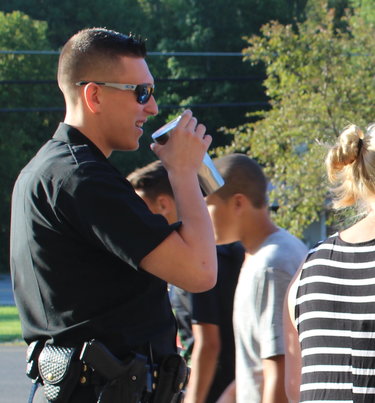BKW board adopts $26.2M budget with 5.1% tax increase, requiring supermajority to pass
Enterprise file photo — Michael Koff
Berne-Knox-Westerlo’s former school resource officer, Deputy Nathaniel Bray, mingles with Berne-Knox-Westerlo students on the first day of school in 2018. The district board of education decided this week to preserve its SRO program, opting for a slightly higher tax rate.
HILLTOWNS — Having avoided Governor Kathy Hochul’s hold-harmless cuts for at least another year, the Berne-Knox-Westerlo Board of Education unanimously adopted a $26.2 million budget on Monday that preserves core programming.
District residents will decide on a 5.1-percent tax increase, however, when they cast their ballots on May 21.
This will require 60 percent of voters, a supermajority, to pass the budget since it goes over the state-set cap. Each year since the tax cap was enacted a decade ago, only a handful of districts statewide have attempted to override the levy limit.
The additional tax money covers the 2-percent decrease in state aid, among other things. The district receives more in state aid than it does through its tax levy.
Although state legislators had rejected changes to Foundation Aid’s hold-harmless clause, which protects schools like BKW that are suffering declining enrollment from losing aid for that reason, the state budget does include a reformulation of the inflation factor. Under the previous formula, inflation would have been calculated at 4.2 percent, but now is 2.8 percent.
And while BKW doesn’t have to worry about deeper cuts related to hold-harmless this year, the state budget includes $2 million for the state university’s Rockefeller Institute to conduct a study to overhaul the Foundation Aid formula.
Superintendent Timothy Mundell explained at Monday’s school board meeting that the change in state aid this year came from changes across the various domains. “Some shifted up, some shifted down,” he said, in the time between the finalization of the budget and the initial proposals.
Other revenues — rebates, refunds, and payments from other districts, Mundell explained — have gone up by nearly $100,000, while the district’s assigned fund balance has gone up by $380,500.
On the expense side, the largest category — instruction — increased 10 percent, from roughly $10.9 million to nearly $12 million. This is slightly lower than where the administration landed earlier, having “shifted some of those expenses around to different segments, different lines, and actually removed some administrative money out of instruction and back into general support administration,” Mundell said.
Transportation and debt service are also up, slightly, while the remaining categories — general support, employee benefits, and interfund transfers — saw a decrease, leaving an overall cost increase of $629,301, or 2.45 percent.
Mundell said that the district is saving on two full-time positions due to attrition, along with reduced costs for Boards of Cooperative Education Services assistance; the annual bus replacement, which was put off for this year; support for the lunch program and special services; a late-bus run; and the elimination of a proposed deputy superintendent position.
SRO
The original budget proposal had also eliminated the school resource officer, to save $81,000, but board members were uneasy with the prospect of ending that program and voted to adopt the budget with that position included, for an additional three-quarters of a percent on the tax increase, roughly.
Mundell had said that, although he views the resource officer as very positive for the district — not just for support and safety for students, but because of the extra resources the district has access to through the Albany County Sheriff’s Office as a result — it came down to the fact that the salary was a “big number.”
The sheriff’s office would not budget on the salary, he said, since it would weaken their position with other schools that still pay their resource officers’ salaries.
Mundell said that for the position to be saved and the tax rate unaffected, the district would have to cut field trips, Bulldog Club (which is an afterschool program), and another late-bus run.
Board President Kimberly Lovell said that safety is “our first concern,” and that, while the district does not have many serious incidents, she worried that removing the SRO might change that.
Board member Matthew Tedeschi wondered if the board could present two budgets at once — one with the SRO and a higher tax rate, and one without — and Mundell explained that they could put one budget to a vote, then present an alternative budget if it fails before having to go to a contingency budget.
“You can put it up a second time, modify it how you’d like, and if it fails, you can automatically go to a contingency budget,” he said.
Contingency budgets restrain the district to its current tax levy, which for BKW is just over $11 million.
Tedeschi pointed out that the district usually passes budgets by a significant margin, giving them room to lose some voters; however, the board seemed to agree that cutting the SRO would cost more voters than leaving it in with the higher tax rate.
When asked how the SRO benefits the school besides the basic safety, Mundell said that they’re involved in home visits for chronically absent students and teach students about things like bullying and drugs.
“There are lots of things that aren’t necessarily seen, [or] that don’t happen every single day,” he said, adding that an SRO plays an important role in legal investigations, when necessary.
The district’s finance officer, Stacy King-McElhiney, said that, on the other hand, Bulldog Club is an important resource for students who need additional support after school, and that removing the late-bus run would be a burden on families who may struggle to find alternative transportation.
“I’m not in favor of getting rid of the Bulldog Club and the late bus, unless we can figure something else out, but I feel what that position from the sheriff’s office brings us is another level of programming that most schools don’t have,” board member Lisa Joslin said.
May 21 vote
Before the district residents vote on the budget, there will be a public hearing on May 7. On May 21, residents will also send Joslin back to the school board, since she’s running uncontested.
Joslin, of Westerlo, first joined the board in 2021, replacing Randy Bashwinger in an uncontested election after he decided not to run again. Her husband is Westerlo Fire Chief Andrew Joslin and their son, Drew, is an Eagle Scout.



